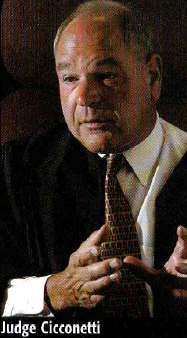MAKING THE PUNISHMENT FIT THE CRIME
Mike Cicconetti, a US judge with a difference

When Michelle Murray was arrested for abandoning some kittens in a forest she expected to get a fine or a short prison sentence. Instead she was sentenced to spend the night in the same cold, dark forest. In the end it was so cold that she only had to spend three hours in the woods, but Judge Mike Cicconetti had made his point. He wanted the 26-year-old Ohio housewife to feel the same pain and suffering as the animals she had abandoned, many of which later died.
Cicconetti allows offenders to choose between jail, and an alternative, `creative' sentence. For example, people accused of speeding are offered a choice between having their licence suspended for 90 days, or having it suspended for a shorter period and spend one day working as a school crossing guard. The judge says that offenders who spend a day helping school children across the street never appear in his courtroom for speeding again.
The judge also sent a man who was caught with a loaded gun to the mortuary to view dead bodies and ordered teenagers who let down tyres on school buses to organize a picnic for primary school children. He has ordered noisy neighbours to spend a day of silence in the woods, or to listen to classical music instead of rock.

Cicconetti attributes his unusual approach to his tough family background. He was the oldest of nine children and had to work part-time collecting rubbish to pay his way through college. He studied law at night school. `I didn't go to a prestigious law firm,' he says, `I had to get to where I am the hard way. It makes you understand what the working man has to go through, and why some of them commit crimes. I want to give people a positive lesson, not a negative one.'
A drawer in his cramped office in the Painesville Municipal Courthouse is full of thank-you letters from both victims and criminals. `Some people will say that my punishments are cruel or unusual,' the judge said. `OK, it's a little bit of embarrassment and humiliation. But when you have people fulfilling these sentences, you are doing it for them and the victims and the community. And above all, I can remember only two people who have been sentenced to alternative punishments and who have reoffended.'
source: New English File, Oxford University Press, upper-intermediate
Wyszukiwarka
Podobne podstrony:
Joe Haldeman To fit the Crime
To Fit the Crime Joe Haldeman
Bob Proctor Making The Impossible Possible
The crime of bad Power Point and how to avoid it
Making the most of extra
Making The Bride s Maid
nobility and making the hussite revolution
Mavis Applewater Making the Grade
Making the most of extra
Isobel Bird [Circle of Three 10] Making the Saint (lit)
Crime and Punishment Analysis of the Character Raskol
Crime and Punishment The Suffering of?ch Character
Crime and Punishment Analysis of the Character Raskolnikov
Paul Knepper The Invention of International Crime, A Global Issue in the Making, 1881 1914 (2009)
Crime Fighter The Awful Eight
Newell, Shanks On the Role of Recognition in Decision Making
Making Robots With The Arduino part 1
Making Robots With The Arduino part 5
więcej podobnych podstron